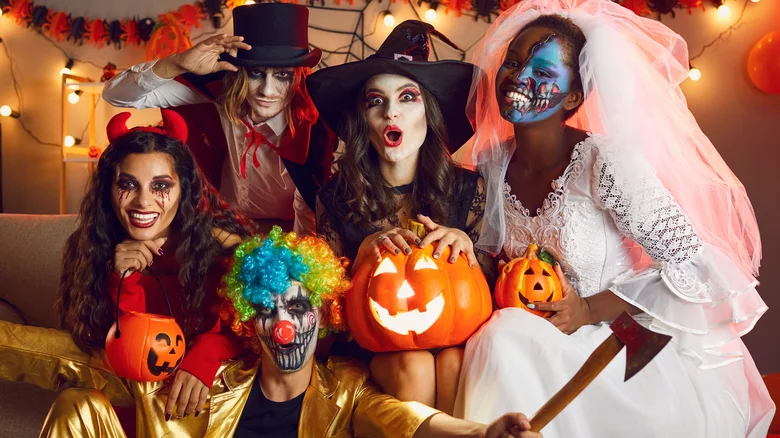Let’s stick to non-offensive costumes this year. Photo Courtesy of Glam.
BREANNA WILSON | OPINION COLUMNIST | bcwilson2@butler.edu
Imagine. You’re invited to a Halloween party. At your local Halloween store, you might come across several costumes like “Reservation Royalty,” “Voodoo Queen” or something equally heinous. Halloween is one holiday where cultural appropriation is rampant and normalized.
Many of these costumes have heavily racist undertones and are rooted in colonialist ideas. They attempt to depict the cultures they allegedly portray as savage, exotic and strange.
Companies such as Spirit Halloween and Party City have been most commonly associated with selling costumes targeting Indigenous, African American, Creole, Asian, Middle Eastern and Latin American cultures. This allows for companies to profit off of misrepresenting entire cultures.
Kamarie Fuller-McDade, first-year biochemistry and multilingual major, believes that capitalism has essentially enabled these corporations to take advantage of these groups.
“[Cultural appropriation] leads to marginalized groups even culturally appropriating each other, causing POC and other groups to fight each other while the 1% corporations make a profit [off] of it during Halloween,” McDade said. “So it’s like a two-in-one thing. Marginalized groups fight each other instead of focusing on the people who cause it, which is the 1% and the 1% profiting off of the holiday in general.”
Two strong examples of marginalized groups stealing from other marginalized groups would be Beyonce and Coldplay stealing from Indian culture in the music video for “Hymn for the Weekend,” as well as Alexis, a Jewish American drag queen, wearing an Indigenous American headdress. Both cases were for profit or for fashion purposes, showing how capitalism’s tight grip on culture refuses to loosen.
Many companies have received enough backlash for them to understand that it’s wrong to have these costumes for sale, but they refuse to yank them from the shelves.
Dylin Eazell, fifth-year speech, language and hearing sciences major, believes that it’s unacceptable for companies to be complacent in acts of cultural appropriation.
“I think that there’s a whole market for it where people think it’s really funny and quirky,” Eazell said. “A lot of the classic ones, like sugar skulls from Mexican cultures [and] geishas from Asian cultures … They’re just disrespectful and based on negative stereotypes that really are harmful to the community.”
Many people that wear these costumes are painfully unaware of the harm they are doing by wearing these costumes. Some think that these costumes are just a piece of fabric made for one-time use, but they are so much more than that. These costumes are deeply rooted in oppression and racism and are used to mock or erase the true history of these groups. By participating in cultural appropriation, they are perpetuating stereotypes and harming marginalized groups.
For Eazell’s examples of geishas and sugar skulls, these specific costumes tend to be oversexualized or shown through a lens shrouded by colonial views, which has resulted in the misrepresentation of these cultures. This and the fact that people continue to buy them from the big corporations results in further harm to these groups.
First-year political science major Justin Deem-Loureiro, an Indigenous student, feels like people are unaware of the harm they’re doing and don’t see the consequences of their actions.
“It’s upsetting to see peoples’ cultures, especially Indigenous peoples’ culture, used as a costume, ” Deem-Loureiro said. “Many native people see their culture completely disrespected, and it hurts because people never truly understand the true concerns of Indigenous peoples. [Change] takes education [and] learning about the land you’re on, the tribes who lived here first and acknowledging their existence by showing respect. And that starts with not culturally appropriating native culture.”
Many of these costumes, such as those that appropriate Indigenous and African cultures depict these groups as barbaric or uncivilized, which is not true in any way. When people continue to wear these costumes, they promote the negative stereotypes about these groups and allow their erasure.
The lack of sensibility and the increase in alcohol during Halloween is an ideal situation for those without better judgment to say and do offensive things that dehumanize specific groups. Eazell agrees that people should be educated enough to know right from wrong when it comes to what they decide to buy off the rack.
Deem-Loureiro believes that the lack of education has caused people to brush off the seriousness of cultural appropriation.
“I think [cultural appropriation is] wrong because I feel like to white people, it’s something to joke about,” Deem-Loureiro said.
Sadly, society has normalized this. People in power have gotten away with cultural appropriation for decades. With their influence, it’s very easy for people to let them get away with it, thus normalizing it in the process. When people see that those in positions of power can get away with doing things like this, it enables them to do the same. Prime examples of this would include Katy Perry and Lana Del Rey performing while wearing traditional clothing from various non-white cultures, late night talk show host Jimmy Fallon doing blackface for a skit and Canadian Prime Minister Justin Trudeau doing brownface in 2001 at a Halloween party. All of these were to gain profit or simply for entertainment. The public’s reaction has been little to none, and these cases seem to be brought up in a joking manner whenever these celebrities are mentioned, showing how little people understand about cultural appropriation.
We should be educated enough as a society to realize how wrong this is, yet we continue to fail the marginalized groups that are disproportionately the subjects of cultural appropriation. We refuse to acknowledge their century-long struggles and use them as a one-time costume to some house that we’ll forget about in the morning.
So, next time you enter a Spirit Halloween, just choose to be a sexy mouse or something that isn’t racist.



